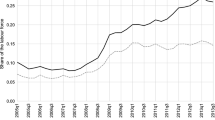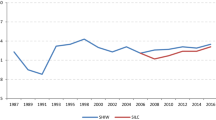Abstract
The retrospectively recalled calendar of activities in the European Community Household Panel is a prime resource for cross-country analysis of unemployment experience. We investigate the reliability of these data and find that 26 % of unemployed respondents misreported retrospectively their unemployment status in the subsequent interview. We observe large differences across countries: While the conditional probability of consistent information is 96 % in the UK, it is just 51 % in Greece for a comparable individual. By analyzing long-term unemployment and unemployment persistence, we show that the results of cross-country comparisons are strongly affected by these data problems.



Similar content being viewed by others
Notes
Cognitive and social psychology provide some guidance for understanding under what circumstances survey responses are likely to be unreliable. Bound et al. (2001) discuss the main lessons of this literature from the viewpoint of economics.
The same issue arises also in other validation studies; see for example Jürges (2007).
The unit non-response rate is defined as 1 minus the ratio of the number of completed interviews to the number of attempted interviews by country. The attrition rate is defined as the share of individuals still in the sample in the last wave who appeared in the panel at least once between the years 1996 and 2001.
References
Akerlof GA, Yellen J (1985) Unemployment through the filter of memory. Q J Econ 100:747–773
Azmat G, Güell M, Manning A (2006) Gender gaps in unemployment in OECD countries. J Labor Econ 24:1–37
Bound J, Brown C, Mathiowetz N (2001) Measurement error in survey data. In: Heckman JJ, Leamer E (eds) Handbook of econometrics, vol 5. Elsevier, Amsterdam, pp 3705–3843
Böckerman P, Ilmakunnas P (2009) Unemployment and self-assessed health: evidence from panel data. Health Econ 18:161–179
Dieckhoff M (2007) Does it work? The effect of continuing training on labour market outcomes: a comparative study of Germany, Denmark, and the United Kingdom. Eur Sociol Rev 23:295–308
Di Tella R, MacCulloch R (2005) The consequences of labor market flexibility: panel evidence based on survey data. Eur Econ Rev 49:1225–1259
Dieckhoff M (2011) The effect of unemployment on subsequent job quality in Europe: a comparative study of four countries. Acta Sociol 54:233–249
EUROSTAT (1999) Statistics in focus 18/1999. EUROSTAT, Luxembourg
EUROSTAT (2010) European Community Household Panel (ECHP). http://epp.eurostat.ec.europa.eu/portal/page/portal/microdata/echp
Gangl M (2006) Scar effects of unemployment: an assessment of institutional complementarities. Am Sociol Rev 71:986–1013
Horvarth FW (1982) Forgotten unemployment: recall bias in retrospective data. Mon Labor Rev 105:40–43
Jürges H (2007) Unemployment, life satisfaction and retrospective error. J R Stat Soc A 170:43–61
Layte R, Callan T (2001) Unemployment, welfare benefits and the financial incentives to work. Econ Soc Rev 32:103–129
Levine PB (1993) CPS contemporaneous and retrospective unemployment compared. Mon Labor Rev 116:33–39
Magnac T, Visser M (1999) Transition models with measurement errors. Rev Econ Stat 81:466–474
Mathiowetz NA, Duncan GJ (1988) Out of work, out of mind: response errors in retrospective reports of unemployment. J Bus Econ Stat 6:221–229
Morgenstern RD, Barrett NS (1974) The retrospective bias in unemployment reporting by sex, race and age. J Am Stat Assoc 69:355–357
Nickell S (1997) Unemployment and labor market rigidities: Europe versus North America. J Econ Perspect 11:55–74
Nickell S (1998) Unemployment: questions and some answers. Econ J 108:802–816
OECD (2002) Employment outlook. OECD, Paris
Paull G (2002) Biases in the reporting of labour market dynamics. The Institute for Fiscal Studies. Working Paper 2002/10
Pellizzari M (2006) Unemployment duration and the interactions between unemployment insurance and social assistance. Labour Econ 13:773–798
Peracchi F (2002) The European Community Household Panel: a review. Empir Econ 27:63–90
Pérez JIG, Sanz YR (2005) Wage changes through job mobility in Europe: a multinominal endogeneous swithcing approach. Labour Econ 12:531–555
Pyy-Martikainen M, Sisto J, Reijo M (2004) The ECHP study in Finland. Quality report. Statistics Finland Living Conditions, p 1
Pyy-Martikainen M, Rendtel U (2009) Measurement errors in retrospective reports of event histories: a validation study with Finnish register data. Surv Res Methods 3:139–155
Russell H, O’Connell PJ (2001) Getting a job in Europe: the transition from unemployment to work among young people in nine European countries. Work Employ Soc 15:1–24
Sudman S, Bradburn N, Schwarz N (1996) Thinking about answers: the application of cognitive processes to survey methodology. Jossey-Bass, San Fransisco
Tatsiramos K (2009) Unemployment insurance in Europe: unemployment duration and subsequent employment stability. J Eur Econ Assoc 7:1225–1260
Terracol A (2009) Guaranteed minimum income and unemployment duration in France. Labour Econ 16:171–182
Acknowledgments
The ECHP UDB data for waves 1994–2001 were provided by European Commission, Eurostat, which bears no responsibility for the results or conclusions drawn by the authors. We thank Marjo Pyy-Martikainen for her comments and help with the data and Annette Jäckle and Kimberly Fisher for their comments. Tomi Kyyrä acknowledges financial support from the Academy of Finland, Grant 133930, and Ralf Wilke from the Economic and Social Research Council, Grant RES-061-25-0059.
Author information
Authors and Affiliations
Corresponding author
Rights and permissions
About this article
Cite this article
Kyyrä, T., Wilke, R.A. On the reliability of retrospective unemployment information in European household panel data. Empir Econ 46, 1473–1493 (2014). https://doi.org/10.1007/s00181-013-0718-1
Received:
Accepted:
Published:
Issue Date:
DOI: https://doi.org/10.1007/s00181-013-0718-1




